 Loading...
Loading...-
As Tunisia continues to move forward on the path of democratisation and pluralism, the problems it may still face remain significant. A comparative analysis of the (failed) Algerian attempt to democratise and the current process underway in Tunisia could shed light on what Tunisia needs to do to avoid a setback in its democratisation process.
Read the full article in the December 2016 issue of the European View, the Martens Centre policy journal.
Dario Cristiani Arab Spring Democracy Foreign Policy Mediterranean North Africa
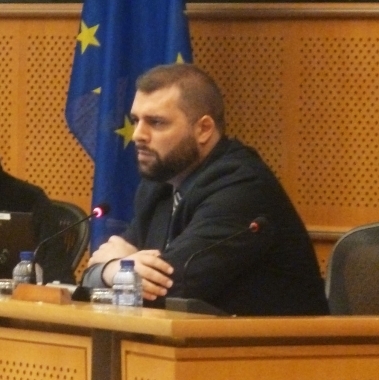
Dario Cristiani
Consolidating pluralism under the terrorist threat: the Tunisian case and the Algerian experience
Blog
07 Nov 2016
-
One of the first lessons of a law student is that not only must justice be done; it must be seen to be done. It seems that in recent times this principle has been hijacked by regimes hungry for legitimacy; to create an outward projection of democracy, citizens are asked to vote, thereby putting the regime beyond reproach. Voting and democracy are inextricably linked in the minds of many; yet often we have one without the other. Egypt and Syria are two recent examples of this. Undeniably citizens voted; democracy was seen to be done. However, when we examine events preceding election day and the elections themselves in a broader context, it is clear that there was little democratic about these elections.
In 2013 violence once again broke out on the streets of Cairo in protests against President Morsi, Egypt’s first president after the initial Arab Spring protests. Army General Abdel Fatah Al-Sisi delivered an ultimatum to President Morsi’s government in July 2013 that unless reforms were delivered in 48 hours it would be removed. When he deemed them incompliant, al-Sisi removed the government, Morsi supporters were violently repressed and al-Sisi appointed an interim president. The army once again intervened to successfully manoeuvre its candidate into the position of president. Jumping on al-Sisi’s popularity, presidential elections were brought forward and held before parliamentary elections contrary to the programme of Morsi’s government. Al-Sisi and the army sought ‘revolutionary legitimacy’ from a democratic election.
This intervention in 2013 was similar to the army’s intervention in 2011 which was pivotal in toppling the Mubarak regime. These interventions were motivated by self-preservation of the army’s status and position in Egyptian society, not by any sympathy for the demands of the protesters. The Egyptian army has been part of the ruling class since the foundation of the state. It presides over an economic empire of its own, financing and managing major projects in areas such as tourism and agriculture. The election was held at the end of May 2014, originally polling was to take place over two days but the polls were extended to three days when the turnout was lower than desired, thereby jeopardising the army’s quest for legitimacy and democracy.
Observers all report that people were intimidated into voting, threatened with fines and charges of treason if they did not go to a polling station. Al-Sisi was declared the victor of a ‘free but not always fair’ election according to EU observers; he had greater campaign resources and media coverage. Democracy International and the European External Action Service found that state-owned and private media coverage overwhelmingly favoured al-Sisi and real debate was stifled; in fact several journalists were imprisoned in the lead up to the election. With 93% of the vote al-Sisi came in well ahead of his only competitor, Hamdeen Sabahi, who received 3% of the vote. Sabahi previously came third in the presidential elections in 2012 that brought Morsi to office. He has lodged a complaint to the elections committee disputing the votes cast on the third day as well as campaigning at polling stations by al-Sisi’s supporters.
Elections were held in Syria with the same lip service to democracy as in Egypt. The Arab Spring in Syria has led to a complex and multi-strand conflict. The unrest in Syria ranges from calls for greater democracy to all out civil war and the ISIS separatist campaign in the north; the only thing in common is the desire for change from President Bashar al Assad’s government. Voters went to the polls as the government dropped bombs from the sky. As a result of the current conflict millions of Syrians have been internally displaced, over 100,000 have been killed and millions more are in camps in Lebanon, Jordan, Turkey, Iraq and Egypt. This is the first multi-candidate election in Syria in decades. Before this al Assad and his father before him renewed their mandate in single candidate referendums. However, the other candidates in June 2014 were vetted by the government and had expressed support for al Assad in the past— – hardly a competitive election. Al Assad was elected with 88.7% of the votes cast. After his election, he said that his government was given fresh legitimacy by the vote and a message was delivered to the West; proof that the aim of holding the election was to put the administration beyond criticism.
The election was packaged as the route to peace and stability in Syria. Here again, the act of voting was used to create the illusion of democracy; how can a vote bring peace and stability to such a volatile situation? A change in leadership must happen. The US and the EU condemned the Syrian election. In April the UN urged the Syrian government not to hold an election as to do so would go against the spirit of the Geneva Communiqué which calls for a transitional government to lead free and fair elections. Voting only took place in regions under government control. Many displaced people were unable to vote and neither were people in rebel-held areas. The election of al Assad was a foregone conclusion; much like in Egypt, voters were asked only to confirm a decision made by elites to create the image of a legitimate democratic government. In Syria this decision was made by the ruling ethnic group, the Alawites, while in Egypt it is the result of an internal power struggle between many actors where the military currently hold the upper hand.
For Egypt and Syria these elections are just the latest development in their long Arab Spring. Though they can be distinguished by different domestic circumstances in both cases an appearance of democracy was created to quieten protesters. The very ideal they seek was used to appease them and maintain the status quo. The ordinary citizens that called for democracy have themselves become disillusioned; why vote when the outcome is predetermined? The promotion of democracy and human rights are founding principles of the EU and play a central role in its external relations policy. The role and use of soft power by the EU is regularly commented on, but when regimes strive to create the illusion of democracy where there is none, it can be argued that this is an impact of the EU’s soft power.
However, the EU can be criticised for a haphazard approach to the effective promotion of democracy, an example of this is an over emphasis on the importance of elections at the expense of, for example, the importance of political pluralism. If we are to pursue this policy direction in external relations then it must be done in a more even-handed manner with equal focus on all the constituent parts of democracy, as proposed in the 2012 EU Strategic Framework and Action Plan on Human Rights and Democracy. Events in Egypt and Syria prove that elements in isolation are not enough to ensure a democracy.
Kathryn O’Donovan Arab Spring Democracy Elections

Kathryn O’Donovan
Elections in Egypt and Syria: two tales of hollow democracy
Blog
20 Jun 2014
-
On March 27, the Centre for European Studies welcomed a delegation of the Alwasat Party (Centre Party) from Egypt. The aim of the meeting was to exchange views on the current political situation in Egypt and to discuss the role of the EU in the country’s transition process. The Alwasat Party aims to be one of the parties engaged in breaking the deadlock between the ruling Islamists and the opposition. With their long history of opposition under the old regime and the current Muslim Brotherhood government, they could act as credible mediators as they are also closely involved in the current political developments of Egypt.
The delegation was formed by Abou Elela Mady, Chairman, Essam Sultan and Hatem Azzam, Vice-Chairmen and Amr Farouk, Speaker of the party. A day earlier, members of the delegation had participated in a conference organised by the Hanns Seidel Foundation (Brussels office), entitled “Polarized Egypt – Can moderate political Islam bridge the gap?” The delegation’s visit to Brussels was facilitated by Christian Forstner, HSS Brussels office Director and Nina Prasch, HSS Resident Representative in Egypt, also present during the meeting.
CES Director Tomi Huhtanen and Ingrid Habets, foreign policy Research Officer, presented the Centre’s activities related to the Middle East and North Africa region in general and Egypt in particular. Mr Huhtanen emphasised that the Arab Spring events had led to an increased focus of the EU on its neighborhood policies; as a result, the CES also started conducting research, establishing links and offering policy advice on the developments in the region. Ms Habets then presented the results of the Springeneration online initiative, a 2011 survey on how the EU could positively contribute to the momentous changes taking place in many MENA countries. She stressed that while the European Union was mainly focusing on human rights issues at the time, the survey revealed that the 70,000 young respondents from the region emphasised instead the importance of cooperation in the fields of education, entrepreneurship and economic development.
Furthermore, Nicolas Briec, European People’s Party Secretary of External Relations, outlined the EPP’s engagement and support for democratic movements in the region. During the 2011 EPP Marseille Congress, the EPP in cooperation with the CES hosted a group of 40 MENA political activists; in 2012, together with the EPP Group and the CES, they welcomed to Brussels political leaders from four Tunisian parties. Through all these activities, the EPP remains committed to dialogue with like-minded partners and parties in the region; in this respect, the work of political foundations such as the Hanns Seidel Foundation are of great added value.
The Centre for European Studies will continue to devote attention and carry out research focusing on developments in this region. To this end, a policy brief by Lorenzo Vidino, senior fellow at the Centre for Security Studies, ETH Zurich, on the role of the Muslim Brotherhood, its challenges and future scenarios will be available online on the CES website end of April.
Arab Spring Foreign Policy Mediterranean Neighbourhood Policy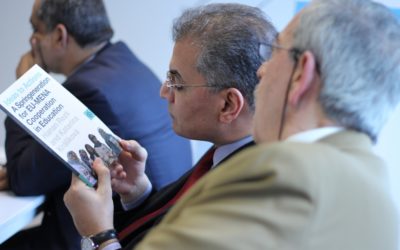
CES discusses political developments with Egyptian moderate party
Other News
28 Mar 2013
-
Tunisia has often been considered both the avant-garde of Arab democracy (having ousted authoritarian leader Ben-Ali already in January 2011), and a bellwether of where its neighbours are going. But ever since the murder of opposition Popular Front leader Chokri Belaïd on 6 February, this country has not been the same anymore. It is true that tension had already been building up in the months before. The economy has hardly recuperated from its 2011 slump, tourism is still at an all-time low, unemployment at dangerous levels and inflation rampant. But the dissatisfaction of many Tunisians with the coalition government of the Islamist Ennahdha and two smaller parties also stems from two political problems they identify with the government: the attempt to impose a more conservative lifestyle on North Africa’s best educated, most secularised society – and the insufficient distinction made by Ennahdha between itself and the more radical, often violent Salafists and other extremists. This dubious role of Ennahdha found its most dramatic expression in the organised violence of the ‘League for the Protection of the Revolution’ (LPR), originally neighbourhood thugs that focused on remnants of the old regime, but that have turned on opposition parties and trade unions in recent months, breaking up meetings and attacking or threatening activists critical of Islamism.
The murder of Chokri Belaïd by as yet unidentified gunmen has radically compounded this already slowly worsening situation. Belaïd, a left-of-centre secular liberal, was a very outspoken critic of Ennahdha and, only one day before his assassination, warned of political violence to come. This violence has now arrived, not only in the murder of Belaïd, but also in street brutality by police as well as the LPR against mostly peaceful protests by secular activists. But the climate of fear that followed is matched by the determination of many thousands of Tunisians that refuse to bend and that will not let the ‘Jasmine revolution’ be hijacked by an Islamism which they now consider a threat not only to their lifestyle but to their very lives.
Yesterday’s resignation of Prime Minister Jebali is a clear recognition of the current Tunisian drama. Early elections are probably the only way now to re-establish some minimal trust of the people in their government. The European Union and its Member States should take note. There are many ways in which the EU can remind the current government of its obligation to stick to minimum human and civic rights standards, especially because it has been democratically elected.
Tunisia can still pull back from the brink. If early elections bring to power a more centrist government with more competence in economics, and police prevents private militias, Salafists and Jihadists from imposing their idea of democracy on the majority of Tunisians, things can in the end turn for the better. Tunisia still has a huge potential. But putting this potential to use will require a strategy with more competence and much stronger roots in civic rights and individual liberty than what we have seen in recent months.
[picture source:www.guardian.co.uk]
Roland Freudenstein Arab Spring Democracy Foreign Policy Islam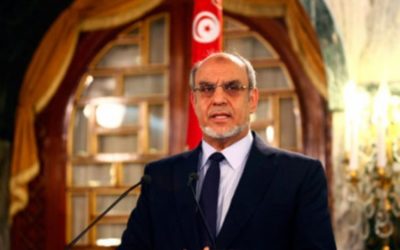

Roland Freudenstein
Tunisia on the brink: After the resignation of Prime Minister Jebali
Blog
20 Feb 2013
-
On 6 December 2011, the Centre for European Studies (CES), with the involvement of the International Republican Institute (IRI), had the pleasure of welcoming friends from North Africa and the Middle East (MENA) to participate in two policy workshops within the framework of the International Visitors’ Programme at the EPP Congress in Marseille. T
he two workshops, titled ‘Youth, education and jobs: investment that makes a difference’ and ‘Inclusion, cooperation and innovation: powerhouses of economic growth’, engaged young activists and leaders from MENA countries in order to define current challenges, brainstorm solutions and explore possibilities for collaboration with Europeans.
Below are five key take-aways from the workshops, generated by the brightest minds in the MENA region. This short list reflects the very latest issues being tackled by the ‘spring generation’ of activists in MENA countries and is intended to provide a basis for future dialogue.
1. Education was by far the most prominent theme in both workshops. Participants agreed that substantial reforms are urgently needed across the MENA region in order to solve a wide range of economic, political and social challenges.
2. One of the main focus points in education reform, from the primary all the way to the university level, should be a greater emphasis on the needs of students as opposed to the needs of teachers, schools or the state.
3. Another focus area should be the correlation between education systems and the actual needs of labour markets, especially in those industries key to spurring economic growth. One potential approach is to focus on ‘centres of excellence’, meaning that specific success stories should be identified, built upon and used as a basis for further reform.
4. In addressing these goals, cooperation is essential, both among MENA countries themselves and between the MENA region and Europe. This cooperation must be broad and must involve not only governments, but also civil society and business groups.
5. Meaningful dialogue and successful cooperation will be most successful if Europeans and Arabs alike make a commitment to seek to better understand and appreciate the viewpoints from which the other is coming. This is especially important when discussing issues such as the inclusion of women in society and in the labour market.
Would you like to make your voice heard on these issues as well? Then participate in the latest initiative of the Centre for European Studies! Go towww.springeneration.eu and share your ideas!
John Lageson Arab Spring Foreign Policy

John Lageson
Building on the Arab Spring
Blog
13 Dec 2011
-
Elections will be held in Egypt between November 28 and January 10 and the political campaign already began at the beginning of this month. Television is a crucial battleground – some figures suggest that TV is the main source of information for as many as 97 percent of Egyptians – but personal popularity will also be vital; Egyptians are brought up to vote not for great policy platforms but for the people they know and like. It seems like the elections will lead to the obvious dominance of Islamists.
Many analysts are convinced that the Islamists are clearly gaining the upper hand against the liberals and some even expect them to dominate the future Egyptian parliament, winning as much as 65 percent of the seats. Some experts also think that a large share of the seats will be won by the more radical Salafists, and to counteract this recommend working with the youth of the Muslim Brotherhood to encourage liberal trends among them, rather than collaborating with the liberals themselves, who have little more than very few supporters and little prospect of electoral success. A strong result for the Salafists would surprise me, given how relatively unimportant and marginalised they appeared to be during my last visit to Egypt.
Having talked to several representatives of various new liberal parties in Cairo, I also disagree with the notion that we should turn our backs on them. They are indeed weak and disorganised at the moment – inexperienced and without powerful structures or resources – but some of them have potential. They are well-educated, articulate, open-minded and motivated. They might not enter parliament after these elections, but they might be able to do so in five or 10 years’ time. Meanwhile, many of them may continue their work building up Civil Society, provided they get support and encouragement. Moreover, even though Islamic political parties are mushrooming at present, not everybody is persuaded that the Islamists really enjoy such popularity.
Some experts believe that they might not win more than 25–30 percent of the seats in parliament. Who is right remains to be seen, but what is clear is that any new rulers who want to keep the democratic transition on track will need to address Egypt’s economic woes immediately and ensure that, at the very least, people’s basic needs are met. Everybody agrees that the Egyptian economy has not been doing well since the revolution; however, some are more optimistic about when the economy will return to its pre-revolutionary state. The greatest optimists believe that the economy be back on track by the end of this year. A slight increase in spending and the gradual return of tourists to the Egyptian coast both favour the optimistic view. However, without reform the Egyptian economy will certainly not emerge from the shadow of its pre-revolutionary path. As long as military permission is required to start up any sort of business, the situation will not change for the better. Inefficient subsidies, for example on benzene 95—a product largely used by the wealthy—, are also not good news for the already considerable Egyptian debt. And the only properly organised force in the country – the Muslim Brotherhood – is not likely to be able to manage this on its own. The Muslim Brothers are well able to discuss morals, values and religion, but the economy is a bit of a blind spot for them.
The liberals, although disorganised, seem to be better suited to solving Egypt’s economic problems. However weak their electoral support at the moment, therefore, they could be vital to their country’s post-election development. But, despite widespread uncertainty about the future direction of their country, Egyptians are fairly positive that Egypt will not return to authoritarian rule and that there is no alternative to a majority government formed on the outcome of free elections. Egyptian fear dissipated with the first drop of blood that fell on Tahrir Square. If they feel that the gains made as a result of the revolution are being destroyed, they will take to the streets for a second revolution.
What useful role, if any, can Europe play in this pre-election positioning? First and foremost, we should not make the mistake of dealing with Islamists as one homogenous group – some of these groups are less democratic than others. Perhaps we should stop talking about democracy and Islamism as an ‘either/or’ issue – which should not keep us form distinguishing between politicians and parties we like more, and those we like less. It is important that free and fair elections take place in Egypt, and that both Egyptians and the West respect the results of those elections. Some assistance from the West might be helpful, for example in guiding and training the nation’s electoral observers to monitor the elections for fairness and transparency. We also should remember one important thing: the Arab Spring was a joyful event; it represented the beginning of the end of the old, undemocratic Middle East. Europe and the West should remember that the situation in Egypt is not about us, and understand that the extent of its influence on the transition is relatively limited. Finally, both Egypt and the West need to show a little more humility and respect for each other’s strategic choices and much more patience over the pace of transition.
Katarina Králiková Arab Spring Elections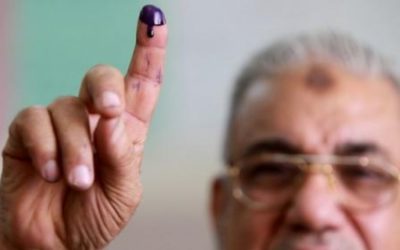
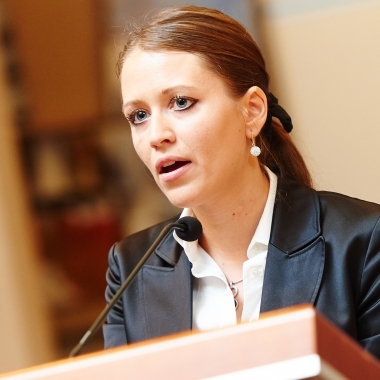
Katarina Králiková
Egypt’s upcoming elections
Blog
21 Nov 2011
-
On 23 October, Tunisia held the first elections in the region after the Arab Spring. The results put the Islamist Ennahda party in the lead, but with the need to form a coalition with one or more secular centre-left parties. • Ennahda’s supporters see the party as a moderate political force supportive of women’s rights; however, its opponents warn of Ennahda’s double discourse and believe that, once elected, hardliners will impose a more fundamentalist view of Islam on Tunisian society.
Ennahda is likely to remain moderate in the short- and medium-term, especially in order to ensure the support of its coalition partners. However, in the longer term its policies could gradually lead to greater Islamisation of the country. • Contrary to the very well organised Ennahda, there are a number of secular, mainly centreleft parties in Tunisia, which are rather disorganised and significantly fragmented. Nonetheless, these parties hope to soon act together to present a more credible secularopposition to the Islamists.
The West should respect the results as a free and democratic choice of the Tunisian people while striving to be an inclusive partner. This means the West should show more trust and offer practical advice and support in the upcoming democratic processes in Tunisia, including the drafting of the constitution and preparing for the next elections. Background Tunisia is the regional front-runner in a number of aspects – its economy, sizeable middle-class, relatively educated population, greater degree of gender equality, vibrant civil society and overall modernity. It was Tunisia which started the wave of change that has infected other Arab countries with the desire for a more free and democratic Middle East, where human dignity is an indispensable part of society.
Tunisia is the first country to organise elections after the Arab Spring which, according to national and international observers, have been open, fair and conducted in a democratic and transparent way. Tunisia was also the first country in the region to withdraw all its reservations about the Convention on Elimination of All Forms of Discrimination Against Women and to guarantee gender parity on the electoral lists of all registered parties. The revolution in Tunisia may have caught the West by surprise, but the same cannot be said about the results of the 23 October elections. The various polls conducted before the elections were right to place the Islamist party Ennahda in the lead. The high turnout in the elections simply confirmed the strong popularity of the party, which, according to unofficial results, show anywhere from 30-40% of the vote and the biggest share of seats in the 217 seat assembly. The rest of the seats in the assembly will be proportionally divided among nine other political parties. Overall, more than 100 political parties across a wide political spectrum – Islamist, nationalist, leftist, communist, green and all imaginable combinations thereof –registered for the elections. Some parties had almost identical platforms, some had no platforms at all and some formed alliances, some of which have been dissolved and others yet to be created.
The results of the elections have provoked some protests in the country, but overall, Tunisians,even those disappointed by Ennahda’s victory, are determined to accept them. The same reaction should come from the West. After all, this result reflects the will of the Tunisian people. Who is the winner? Ennahda, or the Renaissance Party, is described, mainly by its supporters, as a moderate Islamist party; they argue the party is in the centre of the political spectrum, supports economic freedom and opposes radical Islam. It is the best-organised political force in the country and is well-funded with the strong grass roots support in the poorest areas. Its opponents, however, are doubtful of its moderate views and advise caution regarding Ennahda’s so-called ‘double discourse‘; while its leaders say one thing when secularists and the West are listening, local activitsts and imams in the mosques do the other. It is true that in its early stages, Ennahda – originally inspired by the Muslim Brotherhood in Egypt – was aligned with more extreme Islamist movements in the Arab world and was known for the strongly-conservative writings of its leader Rachid Ghanouchi. But this was more than 20 years ago, before the party was banned by the regime and Ghanouchi exiled to London where, according to some observers, he moved from classic conservatism to a more liberal way of thinking. Some observers argue that highlighting their moderate, progressive, rights-based approach to governance was just part of the election campaign, a guise to appeal to voters. These critics believe that, once elected, hardliners will impose a more fundamentalist view of Islam on Tunisia’s society, enforcing the code of morality and revising the code of personal status, thereby creating a negative impact on gender equality.
The election results now give Ennahda the opportunity to demonstrate how religious and how conservative the party really is and whether the Islamist fear, which was often used to support repressive government policies, is justified. Ennahda is in a powerful but precarious situation. It won the elections but cannot rule alone and needs to form a coalition with secular parties. This should be a reassuring aspect for those who fear a complete Islamist takeover.
Ennahda must now move from a protest movement to being the most important player in a coalition government. Another challenge for the party is that despite being a largely one-man show, it needs to work seriously within its lower cadres and with groups beyond the entourage of Rachid Ghannouchi. It also needs to confront ideological divisions within the party which have already led some of the more reflective personalities to leave to form their own groups. If the party wants to prevent further divisions, it does not have the luxury of becoming too conservative. More strategically, Ennahda‘s leaders must realise that women’s rights are very important to the majority of the population and that if they go back on their campaign promises and put limitations on a concrete rights-based legislation (by introducing concepts such as forced veiling, limitations on female education, polygamy, etc.), they will face opposition from within their own party as well as from outside, which would reduce their chances of being re-elected. Therefore, in the short- to medium-term they are only likely to adopt aesthetic modifications such as allowing the hijab or even niqab in universities or overturning the ban on veils in national identity card photographs.However, in the long-term this could lead, step by step, to greater Islamisation of the country.
Another worrying aspect for many Tunisians is that Ennahda’s internal party elections have been postponed until after the national elections, thereby giving Ennahda members a chance to elect a new and potentially more conservative leadership. Members of banned and more radical political groups such as the Salafi Hizb al-Tahrir have expressed interest in participating in the internal elections. If the party’s hard-line conservatives then come to power, there would be significant questions about Ennahda’s commitment to a moderate stance supportive of women’s rights. Who are the others? Since Ennahda has not won a majority of the votes, it will have to create a coalition with one or more secular parties. This means that it will need to promote a more moderate agenda to ensure the support of its coalition members. At the moment it seems like the coalition will be formed with two secular centre-left parties, namely Congress for the Republic and Ettakatol. Congress for the Republic, which came in second in the elections, was legalised after the revolution, while Ettakatol, or the Democratic Forum for Labour and Liberties, existed as an opposition party already under the Ben Ali regime (but was largely marginalised).
The main opposition party is likely to be the secular and centre-left Progressive Democratic Party (PDP). The election results were a huge disappointment for this party which, according to preelection polls, was expected to be the runner-up; in the end it only received around 10% of the vote. This could be attributed to the fact that the party was not as marginalised as the others, acting as the biggest opposition party during the Ben Ali regime. This clearly shows that Tunisians want to see a complete break with the past. The PDP will most probably form an alliance with other like-minded parties, including the Democratic Modernist Pole and the Party of Tunisian Workers, to offer a more credible alternative to Ennahda. The PDP’s main centre-left rival, Ettakatol, declined the offer of an alliance, but there are a number of other small parties who may join at a later point. Since there was such strong secular-Islamist polarisation prior to the election, many parties may be willing to make otherwise unlikely alliances within the secular ‘bloc‘ of parties.
Furthermore, a majority of the parties have been formed in the last eight months which, according to some analysts, means that the members – in order to support freedom, peace and development – are more flexible on their beliefs rather than being firm with regard to their individual programmes. Other analysts challenge this argument by saying that the secular liberals are too divided and that it will be difficult to overcome this fragmentation due to ‘massive egos‘ of most of the party leaders. Therefore, they predict that these parties will go into the ‘political wilderness‘ for some months and later realise that they can becomerelatively strong only if they get to acts together. What message for the West? The West should show a little more trust in both the Tunisian Islamists and the Tunisian voters:The Islamists have been democratically elected and therefore will be accountable to the voters.They cannot push an agenda that the majority of the population does not want. Otherwise theirpower could easily have a short life; if they push forward an agenda that is too conservative, they will risk the same end as Ben Ali – an ejection from office. The revolution has simply broken the fear of Tunisian people and if politicians overstep their boundaries, people will take to the streets to protest. Moreover, Tunisia has a relatively developed civil society, the highest literacy rate in the Arab world and a westernised cultural environment, especially in Tunis and the coastal areas.
All this, including the importance of tourism for Tunisia’s economy, constitutes a considerable hedge against extremism. The West should not turn its back on Tunisia’s Islamists, and instead should reach out to them. Analysts by large agree that the more excluded the Islamists are by the international community, the more radicalised they can get. But even if the Islamists in Tunisia remain moderate and take the Turkish AKP as a role model, it does not mean that there is no reason for caution. Looking at the AKP in the last years, the party has shown a growing influence over the judiciary and increasing restrictions on media freedom. On the foreign policy front, Turkey’s intentions in Iran, Israel, Sudan and its stance in NATO raise questions about whether this is the best example for a new Tunisia. Thus, the West should pursue a balanced mixture of trust and caution; it should be a partner who listens carefully and learns fast. The newly elected assembly will draft a new constitution, appoint an interim government and set a date for new elections late next year or in early 2013. There is certainly room for the West to offer practical advice and support in all these democratic processes.
Finally, what about the lack of trust? Such a lack has been proven to be best repaired through people-to-people programmes. Therefore, the West should place a strong emphasis on student exchanges, summer schools and cultural exchanges and internship placements for both Tunisianstudents in the EU and vice-versa.
Katarina Králiková Arab Spring Elections Foreign Policy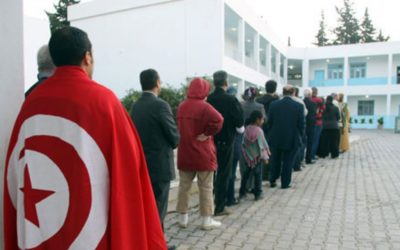

Katarina Králiková
Tunisia’s first elections after the Arab Spring
Blog
27 Oct 2011
-
Following the Arab spring, the power of social networks to drive social protest movements was acknowledged worldwide. Social networks, used mainly by young people, collected and crystallized their demands for change and also gave them the opportunity to get in touch with each other.
However, the official regimes in these countries had to face new social demands and new technological challenges at once. And as we know, in many cases they didn`t succeed in this.
The Belarusian internet revolution started in June from the simple idea of trying to see the people who are ready to protest off line. Belarusian society, thoroughly entrenched in the regime of Aliaksandr Lukashenka, has been suffering for the last 15 years under the grip of the state ideology. Relative economic stability, based on cheap Russian oil, was sufficient to keep ideological control over a large part of the voters. As for its ideology, the Belarusian regime, usually described by Western media as the “last dictatorship in Europe”, is also the last fortress of Soviet political values. The notorious official ideology of Belarus still characterises the country as part of non-existing Soviet state and constantly refers to the Soviets’ moments of glory, like the victory over fascism or the first space flight. In contrast to this artificially imposed, frozen ideological framework, the society is going through a difficult period of self-identification. The economic crisis was a trigger for another round of self questioning about the path that Belarus should take.
The state of play The group created in the Belarusian segment of the Russian replica of Facebook – VKontakte, known as “The Revolution through Social Networks”, called for the public to gather on the main squares of Belarusian cities at 19:00 each Wednesday. The first protest on 15 June was conceived as a manifestation of support for the car owners’ protest, which took place earlier that week. In order not to provoke the regime`s security forces it was decided not to perform any activities, but rather to have a “silent” protest. However, as the situation developed, protestors were inspired to choose their own very special way to express their disagreement: each time one of the participants was detained or harassed, people applauded. That was how the “silent” protests gained their “voice”. The number of participants grew rapidly. In Minsk there were 400 participants on the first Wednesday and 2,000 by the third Wednesday. In some of the cities these protests were the largest of any in the last 10 years.
As for virtual participation, the group on VKontakte has around 14.000 and is still growing. The movement also has Twitter and Facebook accounts. The way the protests were organised and the unexpected number of protestors were a real challenge for the Ministry of Interior. Being classical Soviet institutions, the Ministry of Interior and the KGB were not prepared both structurally and ideologically to even classify them. During the first protest they were desperately and unsuccessfully trying “to keep the order”. As for the virtual response to the protests, the KGB immediately used its ultimate cure, which it is using in response to all Internet “plagues”–blocking the web page of the group. There were some weak attempts to play on the same field as the protestors by creating accounts and by spamming the page with abusive content. However, the virtual revolutionists were vigilant and were publicly denouncing them. After have tried for a while to fight the virtual revolution with its own weapons, the Belarusian coercive structures resorted to their classical methods: arrests, intimidations and physical force. But not only the Belarusian regime was surprised by the success of the idea of the internet revolution. The Belarusian opposition was left out in the organization of the largest non-election protests. Being sceptical and divided in the beginning of the protests, the Belarusian democratic elites then changed their minds and tried to catch up at the last minute by signing an agreement of cooperation. The majority of the democratic parties and movements are supporting the protestors. Independence Day The Lukashenka regime is focusing its efforts to keep society under control by carrying out pseudo-patriotic events.
Lukashenka is appealing to Soviet history, and by distorting the facts, presents the Belarusian people, and particularly himself as the representative of Belarus, as the main contributors to the victory over fascism. Therefore, all dates connected to WWII are largely celebrated in the whole country. The last event of that kind was Independence Day on the 3r dof July in Minsk. Knowing the significance of this military parade to the ruling regime, the organisers of the internet-based group proposed gathering during the parade. The state security forces and the Ministry of Interior were vigilant, and everybody who was applauding “inconveniently” as well as others were detained directly on the parade stands. Other participants moved to the Railway stations’ square. There they were dispersed by special forces, with about 100 taken to temporary detention centres. Plainclothes agents acted violently toward women and teenagers and used tear gas against journalists. Many of the protestors were severely beaten. However, the next day, the organiser of the group stated that the protests will continue and the violent reaction of the authorities will only trigger more of them. …
Will it end in the same way as in North Africa? We will see on Twitter!
Alena Dzemidzenka Arab Spring Human Rights Neighbourhood Policy Technology
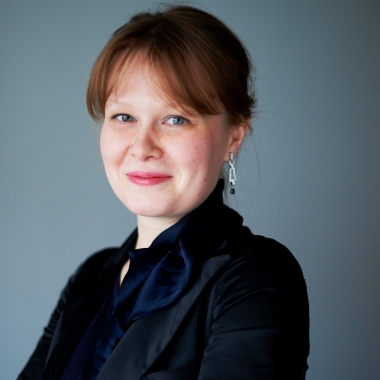
Alena Dzemidzenka
Belarus: Social Networks and an end to Lukashenka’s regime
Blog
06 Jul 2011
-
On April 28-29, 2011 the Party of European Socialists (PES) organised a Euromed Conference – Arab revolutions: time for democracy and progress – in Tunis together with the main PES political partner in Tunisia Democratic Forum for Labour and Liberties (FDTL), and other representatives of the opposition and political parties in the region. It was the first conference held by a European political party in the region since the revolutions, with the aim to create a platform to promote democratic principles.
Participants
The conference brought together around 100 participants from PES member parties and associated organisations from Austria, Belgium, Denmark, France, Germany, Greece, Italy, Netherlands, Spain, Sweden, Malta, UK, Norway and Switzerland and like-minded representatives not only from Tunisia, but also Algeria, Bahrain, Egypt, Iraq, Iran, Kurdistan, Jordan, Lebanon, Libya, Syria, Morocco, Palestine, Yemen. The PES also invited special guests; including people such as the Director of the Foundation Res Publica, Portugal, co-founder of EuroArab Forum, Secretary General of the European Forum and Secretary General of Solidar, as well as representatives from Turkey. The President and Secretary General of the PES attended the conference, and so did the Deputy Secretary General of S&D in the European Parliament and Secretary General of PES’ official foundation, Foundation for European Progressive Studies (FEPS). Some members of the European Parliament, members of national parliaments, international secretaries of the PES’ affiliated parties and a few bloggers also joined the conference. Judging from the list of participants, journalists and other media representatives were not present at the conference.
Content
On the first day the conference was divided into two sessions, discussing how to create a new Euro-Mediterranean partnership, consolidate democracy and ensure the success of the revolutions. During the dinner debate various actors of the revolutions shared their experiences. In general, speakers emphasised the role of the youth and the strong impact of new technologies as new but strong kinds of political mobilisation, and the role of women in the process of democratic reform. Calling FDTL Secretary General Mustapha Ben Jaafar ‘my good friend’ and Tunisian people ‘heroes of democracy’, PES President Poul Nyrup Rasmussen during the press conference apologized for ‘Europe not having done a good job’ in the region in the past. In his speech, he also did not forget to attack the EPP and the leaders of the EPP member parties. This time he directed his criticism towards Italian and French governments for their request to temporarily suspend their Schengen commitments due to an influx of migrants to their countries. The next day, April 29, two morning sessions looked at Social Democrat parties of the region and addressed the social and economic problems, looking at ways how to ‘answer the demands of the people for a fair and just society’.
New media
The conference was followed on Twitter, however, less than 10 twitts have been entered with most of them coming directly from the PES Secretariat. In parallel to the conference, the debate could have been continued also on the Re:new, the PES website-based platform for debate. However, this possibility has not been used. Outcome The conference resulted in the adoption of a formal declaration. The declaration emphasised that the PES must ensure transparent and credible foundations in terms of institutions, law on political organizations, financing of political parties and constitutional safeguards, and underlined the essential role of opposition political parties, trade unions and civil society in the transition process. The declaration encouraged the Socialist and Social Democratic movements to cooperate very closely for the upcoming elections, and to reject any assumptions regarding the incompatibility of democracy and Islamic traditions. The declaration also condemned the actions of the Gaddafi regime in Libya, violence against protesters and civilians in Syria, questioned the extent of reforms undertaken in Morocco, Jordan and Algeria and expressed its concerns about outcome of the protests in Bahrain and of the upcoming local elections in Saudi Arabia.
In addition, the declaration included more concrete recommendations to the EU: 1. The EU must take all necessary steps to implement an Emergency Programme to support the countries in different forms to all emerging democratic movements, e.g. support regional development, investment plans, civil society, media expansion, active engagement of young people and to open European markets for agricultural products from the region. The declaration did not specify how this should be done. For example, the Emergency Programme could include more concrete suggestions on how to develop civil society and independent media or a suggestion for the EU’s rule of law mission to Tunisia. 2. The EU should promote association agreements and advanced status negotiations, as well as specific visa regimes and free mobility, but this should be conditional to progress in key democracy areas. Here again, the declaration could be more concrete: what does specific visa regime and free mobility mean – e.g. reducing the cost of visas, granting long-term visas to businessmen, students and civil society, or giving opportunity for Tunisian students to spend a year at European universities and vice versa.
In this context, the Party of European Socialists committed itself to play a fundamental role vis-à-vis the EU’s actions in the region and via its Action Plan to: 1. Coordinate actions with the S&D Group in the EP, FEPS, the Global Progressive Forum, the European Forum for Democracy and Solidarity and national progressive foundations and provide support for party-building and capacity-building through training and recruitment in close cooperation with the regions’ like-minded parties. Already in its earlier statement from February, the PES underlined the important role of FEPS in the process which should provide assistance and raining for political parties and think tanks and therefore the EU should make extra funding available to European political foundations. However, judging from the FEPS website, no initiative has been taken in this regard since the revolutions (no paper published, no event organised, no mention of the conference organised by the PES, etc.). 2. Help with campaign programmes and political strategies for the upcoming elections. How the PES is going to do this, remains unclear. It could possibly be done through the creation of an advisory commission for elections which should include representatives from Central and Eastern Europe, since they have gone through a similar process in recent history. 3. Help the EU identify new strategies to manage migration flows. 4. Establish a Task Force composed of parties and foundations and create a network bringing together relevant actors from both sides of Mediterranean. The creation of a Task Force has already been mentioned in several earlier documents adopted by the PES. The conference just confirmed the PES decision to form this Task Force but did not come up with any more concrete decisions in this regard.
A follow-up conference to evaluate the implementation level of the Action Plan is scheduled for spring 2012.
Katarina Králiková Arab Spring Democracy Political Parties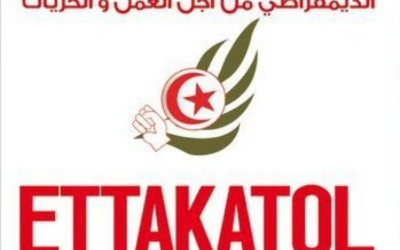

Katarina Králiková
PES Euromed Conference in Tunisia
Blog
02 May 2011
-
Founded in Egypt in 1928 by Hassan al Banna, the Muslim Brotherhood (MB) is the oldest and most influential modern Islamist movement. As per its motto ‘Islam is the solution’, the MB sees Islam as an all-embracing system governing all aspects of private and public life that, once implemented, constitutes the antidote to all the social, moral, economic and political ills plaguing Muslim societies.
Even though it does not completely eschew the use of violence for political goals, the MB aims to achieve its goal of establishing a purely Islamic system of government as a natural consequence of the peaceful, bottom-up Islamisation of the majority of the population.
The brief analyses the situation of Muslim Brotherhood (MB)-inspired entities throughout the Arab world two years after the beginning of the Arab Spring. In keeping with the flexibility and political opportunism that has characterised the group since its early days, Muslim Brotherhood inspired entities have adopted different positions according to the circumstances. In Tunisia and Egypt, where for the first time in history they have gained power through elections, MB entities are trying to gradually solidify their positions and advance their agendas while avoiding dramatic moves that could undermine their still weak hold on power.
In Arab countries where authoritarian regimes still rule, Muslim Brotherhood entities are adopting positions ranging from participation in government to military confrontation. The brief concludes by analysing potential concerns for Western policymakers and future scenarios.
Arab Spring Democracy Elections Foreign Policy Islam
The Muslim Brotherhood after the Arab Spring: Tactics, Challenges and Future Scenarios
Policy Briefs
29 May 2013
-
An action plan for EU–MENA cooperation in the field of education should aim to (i) strengthen ongoing projects under the Euro-Mediterranean Higher Education and Research Area while initiating new policy mechanisms to support quality education and network-based governance and (ii) coordinate EU efforts with those of other donors to create sound policies that are politically and administratively feasible.
Arab Spring Foreign Policy Middle East
Ideas to Actions: A Springeneration for EU-MENA Cooperation in Education
Other
01 Nov 2012
-
In the aftermath of this year’s revolutions, the EU has rightly recommitted itself to the support of democracy and human rights in the Middle East and North Africa. However, although protesters across the southern Mediterranean share some of the EU’s values, they do not see Europe as a political model and democracy in the region is likely to produce some results with which Europeans are not comfortable. This brief argues that, in response, the EU should focus above all on the development of legitimate and accountable governments in post-revolutionary countries in the Arab world. Rather than backing specific political groups in countries that are in transition, the EU should work to create the building blocks and background conditions for fair and inclusive politics. The EU should also try to support human rights through transparent diplomacy and support for civil society. In countries such as Morocco that remain undemocratic, the EU should develop a more political approach that pushes harder for incremental reform in return for credible benefits, while continuing to engage on other EU interests. The use of violence against civilians in countries like Syria should be a red line for limiting cooperation, drawing condemnation and sanctions in severe cases. EU proposals on conditionality and a new European Endowment for Democracy will be most effective if they are focused on the support of accountable and legitimate government.
Arab Spring Foreign Policy Neighbourhood Policy
Europe and the Arab Revolutions
Other
01 Jan 2012


